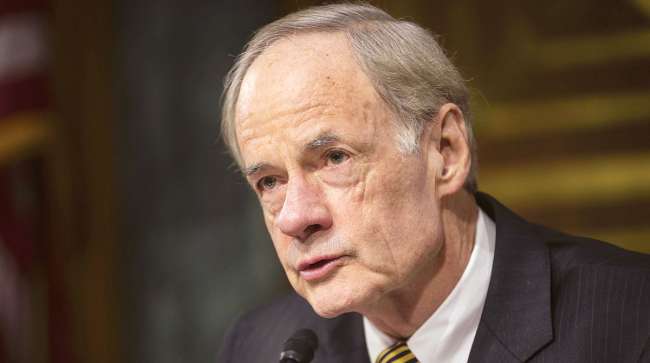Senior Reporter
Senate Debates $1 Trillion Infrastructure Bill

[Stay on top of transportation news: Get TTNews in your inbox.]
Legislation meant to upgrade and modernize the country’s freight networks, drinking water system and railroads garnered a mostly bipartisan reception during its ongoing consideration this month in the U.S. Senate.
The $1 trillion Infrastructure Investment and Jobs Act is projected to gain approval in the chamber. A vote on passage of the bill had not been scheduled as of Transport Topics’ publishing deadline.
Sen. Tom Carper (D-Del.), the chamber’s top transportation policymaker and the bill’s manager during its floor consideration, sought to offer perspective about the timing of the legislation.
WATCH LIVE: I’m on the Senate floor to discuss why we need to pass historic, bipartisan infrastructure legislation. https://t.co/jfqz3Wm4Kn — Senator Tom Carper (@SenatorCarper) August 2, 2021
“We’ve incorporated badly needed climate provisions in surface transportation, water, power and a number of other infrastructure programs. But, in truth, we have, in the words of Robert Frost, ‘miles to go before we sleep,’ ” Carper said.
“All of us who serve here together understand that every race won begins with a first step and ends with a final one. With the enactment of this legislation, we’ll be taking not one, but a number of important steps. In the days ahead, we will move a good deal closer to the finish line in a race with a dangerously changing climate that we simply cannot afford to lose,” added Carper, whose sentiment was echoed by fellow Democrats and the few Republicans who called for the bill’s consideration.
The infrastructure measure aims to modernize connectivity systems, upgrade water corridors and expand electric vehicle charging stations nationwide, and enhance rural access to broadband internet. It also would promote programs associated with infrastructure grants at the U.S. Department of Transportation and launch policies to address the impact of severe-weather events on infrastructure. Additionally, it would update the country’s premier highway law, which expires at the end of September.
Dollar Details
Spending proposals in the $1 trillion infrastructure bill:
• $100 billion for roads and bridges
• $66 billion for freight and passenger rail
• $65 billion for broadband internet
• $46 billion for severe weather-resilience operations
• $39 billion for transit
• $25 billion for airports
Specific to trucking, it would approve an apprenticeship for truckers younger than 21 to operate commercial vehicles interstate. The bill would establish a truck leasing task force, direct the secretary of transportation to further research side-underride guards for commercial vehicles, and require the U.S. Department of Transportation to analyze the cost and effectiveness of electronic logging devices, as well as examine the Federal Motor Carrier Safety Administration’s review of ELDs. The bill also would require certain commercial motor vehicles to be equipped with an automatic emergency braking system within two years of the bill’s enactment.
“People know … when they’re driving over potholes or getting trucks stuck in traffic jams or not being able to get a product because the ports are backed up, which they are right now,” said Sen. Rob Portman (R-Ohio), one of the bill’s lead negotiators. “Our ports are inefficient. And therefore, people literally can’t get products, they can’t get cars or they can’t get an electronic device, that’s all part of this. So this is one that ought to bring us together, and it does bring us together.”
The bill would be backed partly via unused federal COVID-19 emergency relief aid, as well as certain tax enforcement rules.

Schumer
If the infrastructure legislation passes the Senate, Majority Leader Chuck Schumer (D-N.Y.) signaled the possibility of the chamber immediately considering a $3.5 trillion budget package that would set in motion debate on climate change and so-called “human infrastructure” proposals. The budget-centric measure, which would require a simple majority to pass in the Senate, is likely to be scheduled for a vote after the congressional August recess.
Thus far, Republican leaders say they are staunchly opposed to it.
“This $3.5 trillion reckless bill that’s coming right after the physical infrastructure bill, absolutely is a straight up ‘Green New Deal,’ along with re-social engineering our entire country,” said Sen. Shelley Moore Capito (R-W.Va.), a floor manager of the infrastructure bill. “That is very worrisome, and I think we’re going to fight that one tooth and nail.
But we do believe, and I believe, that physical infrastructure, core infrastructure, airports, rail, broadband, all of these things, to give a big boost to that, would benefit everybody, and I think we would have the resulting economic growth.” The “Green New Deal” is an intricate policy proposal introduced by progressive Democrats.
That is very worrisome, and I think we’re going to fight that one tooth and nail.
Sen. Shelley Moore Capito (R-W.Va.), on the GOP's stance against the Democrats' $3.5 trillion budget package
On the House side, Speaker Nancy Pelosi (D-Calif.) is suggesting the House would legislate on the $3.5 trillion budget-centric package alongside the $1 trillion infrastructure bill. Separately, Rep. Peter DeFazio (D-Ore.), chairman of the transportation committee, is calling on senators to meet with his House colleagues to produce a final version of the $1 trillion infrastructure bill. DeFazio argues his committee crafted climate change policies that would improve the Senate bill.
Meanwhile, the White House is championing Congress’ focus on infrastructure policy as President Joe Biden tours the country to promote his “build back better” agenda.
“We’re going to continue to highlight what the bipartisan infrastructure deal will mean for families across the country, as we will digitally as well,” said White House press secretary Jen Psaki. “Right now, there are up to 10 million homes with lead service lines and pipes.”
Want more news? Listen to today's daily briefing below or go here for more info:


